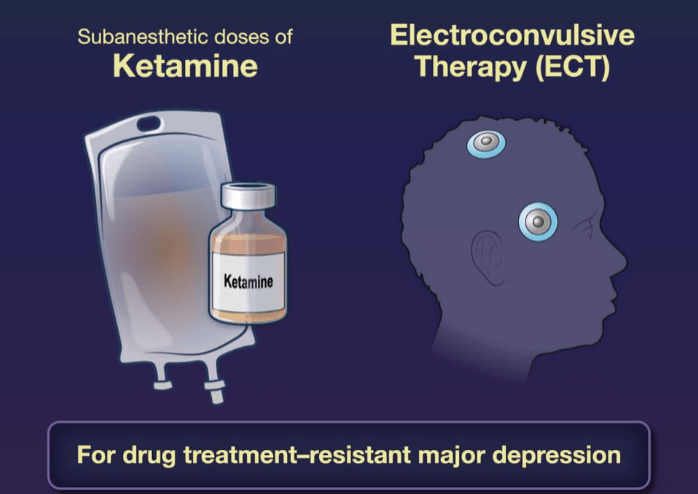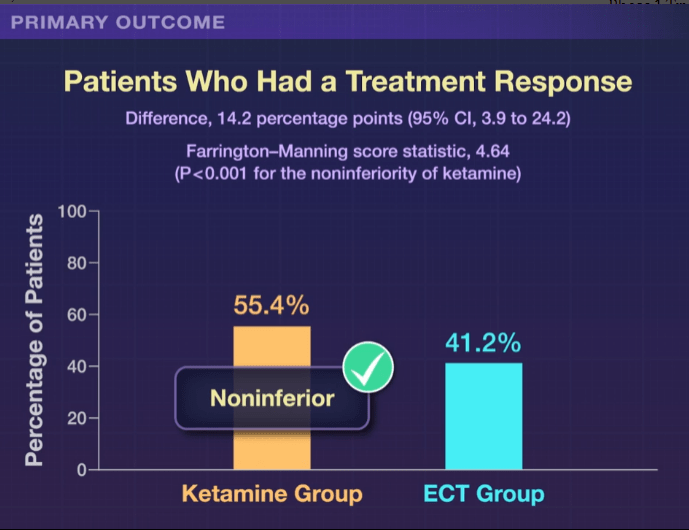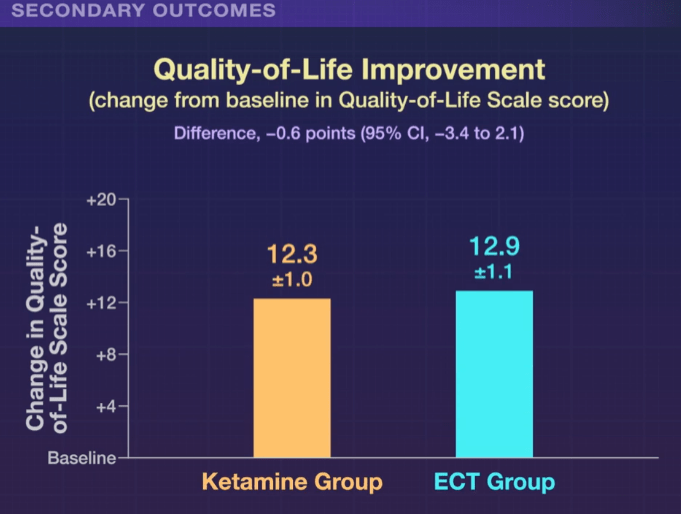Great News! A new study shows that Ketamine infusion rivals ECT in treating depression. As an experienced doctor specializing in ketamine treatments for the treatment of mental health disorders, I’m here to help you navigate the tough decision between Electroconvulsive Therapy (ECT) and ketamine infusion. If you are considering ECT but worried about side effects, why not explore the wonders of ketamine?
Understanding Treatment-Resistant Depression: First things first, let’s talk about treatment-resistant depression. It’s like facing an uphill battle every day, with conventional treatments not always providing the relief we desperately seek. Individuals can also face severe side effects from many different medications and combinations of medications. Believe me, I’ve seen this struggle countless times in my patients, and its heart-wrenching.
ECT – Shock Therapy: Electroconvulsive Therapy, or ECT, might sound like something out of a sci-fi movie, but it’s been around for a while. ECT has a long-standing history in mental health treatment, dating back to the 1930s. Despite initial reservations, ECT’s efficacy and benefits have been demonstrated in numerous studies. It remains a potent option for those struggling with treatment-resistant depression, offering hope and relief to individuals seeking a path to wellness.
It involves administering electrical currents to the brain to induce a controlled seizure. During the procedure usually done in the operating room under anesthesia, controlled electrical currents are administered to the brain, inducing a brief and safe seizure. This process triggers significant changes in brain chemistry, regulating neurotransmitters. ECT’s effectiveness is well-established, particularly in severe and treatment-resistant depression cases, offering rapid relief and improved overall functioning.
Side Effects and Treatment Process: While considering ECT, it’s crucial to be aware of potential side effects, with temporary memory loss being the most common concern. However, memory usually improves over the course of a few weeks. The process typically involves several sessions (6 or more), personalized to the individual’s needs, and spaced over several weeks. Some patients find this temporary memory loss a small price to pay for relief from their debilitating depression.
Ketamine Infusion -. Unlike ECT, which involves brain stimulation, Ketamine’s mechanism of action sets it apart from traditional antidepressants. Unlike medications that target serotonin or other neurotransmitters, ketamine works on the brain’s glutamate system as an NMDA receptor antagonist. By blocking certain receptors, ketamine reduces glutamate release, leading to a cascade of molecular events, including increased production of brain-derived neurotrophic factor (BDNF). This process promotes the growth and plasticity of neurons, fostering the formation of new synapses and enhancing existing ones. As a result, ketamine’s rapid antidepressant effects are believed to be linked to its ability to trigger neuroplasticity in the brain. depression.
I’ll never forget Emily, who had tried various antidepressants without much luck. She was skeptical about ketamine, thinking it was just another fad. However, her skepticism waned as she noticed improvements in her mood and energy levels. Emily’s story highlights the individuality of depression treatment; what works for one may not work for another.
Ketamine, on the other hand, tends to have fewer and milder side effects compared to ECT. Some patients may experience dissociation or dizziness during the infusion, but these effects are usually short-lived. Plus, ketamine is not associated with the same memory concerns as ECT. It’s like trading a heavyweight punch for a quick jab. a New study shows that Ketamine infusion rivals ECT in treating depression.
A Head-to-Head Comparison: Ketamine infusion rivals ECT in treating depression
 A recent study compared two treatments, Ketamine and Electroconvulsive Therapy (ECT), to see which one works best for nonpsychotic treatment-resistant major depression “Ketamine versus ECT for Nonpsychotic Treatment-Resistant Major Depression”. This was a study conducted at Harvard that enrolled 400 patients and the results are remarkable.
A recent study compared two treatments, Ketamine and Electroconvulsive Therapy (ECT), to see which one works best for nonpsychotic treatment-resistant major depression “Ketamine versus ECT for Nonpsychotic Treatment-Resistant Major Depression”. This was a study conducted at Harvard that enrolled 400 patients and the results are remarkable.
They recruited patients struggling with nonpsychotic treatment-resistant major depression and divided them into two groups randomly. One group received Ketamine, while the other underwent ECT, and were examined for 3 weeks.
The primary outcome was a “response to treatment,” defined as a 50% reduction in depressive symptoms. Ketamine emerged as a fierce contender, showing it was noninferior to ECT. That means Ketamine infusion rivals ECT in treating depression.

Side effects: As expected, patients who received ECT experienced some decline in memory recall after three weeks, but that memory function gradually improved during follow-up. ECT showed some musculoskeletal adverse effects, while Ketamine led to dissociation. However, these side effects were not severe.
Quality of Life: Ketamine and ECT showed similar improvements in patient-reported quality of life, proving they’re in it for the long haul to help people live better lives.

Making an Informed Decision:
In the end, the choice between ECT and ketamine infusion comes down to your unique needs and preferences. Take the time to educate yourself, consult with your healthcare provider, and listen to your gut. You are the captain of your ship in this fight, and your decision matters.
Conclusion: While Ketamine infusion rivals ECT in treating depression, there’s no clear winner in the ECT vs. Ketamine Infusion smackdown. Both have their strengths and weaknesses, and what works for one person may not work for another. The most important thing is to explore your options, make an informed decision, and never give up hope. Remember, you’re not alone in this fight, and we’ll keep searching for better ways to knock out depression together! Keep on fighting!
Remember, there is always hope, and the journey to recovery starts with taking that first step.
References:
Anand A, Mathew SJ, Sanacora G, et al. Ketamine versus ECT for Nonpsychotic Treatment-Resistant Major Depression. The New England journal of medicine. 2023;388(25):2315-2325. doi:10.1056/NEJMoa2302399

